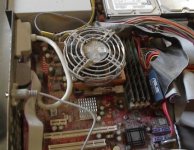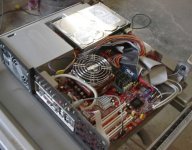I have a question that has been on my mind for some time now. How do you clean up all the accumulation of dust, grease, etc, that has accumulated on the inside of the receiver/amp/tuner, under the top grill?
Over the years this can amount to quite a bit of junk and really should be removed if the unit is going to look nice. The only problem is that I don't know how the professionals do this.
Is there some sort of spray that is sprayed on the surface, where it bubbles up and then dries, where it can be blown away with air? or is there some other method that is easier than painstakenly using Q-Tips and some sort of solvent.
Over the years this can amount to quite a bit of junk and really should be removed if the unit is going to look nice. The only problem is that I don't know how the professionals do this.
Is there some sort of spray that is sprayed on the surface, where it bubbles up and then dries, where it can be blown away with air? or is there some other method that is easier than painstakenly using Q-Tips and some sort of solvent.
Normally I just use compressed air and a vacuum cleaner with a homemade mouthpiece of hard paper 😉
My best cleaning tool is a brush I got at the auto parts store. It has a wood handle, bristles that are about 0.7" diameter by 1.6" long. I think they're for cleaning around knobs and such on your cars dashboard. That works good for dust and gets between the pins on circuit boards. Compressed air is good too. Be careful with compressed air and vacuum cleaners, as they can generate enough static to damage components. I use 'em and have never had a problem, but it's documented in ESD literature. Back in "the day" is was not unheard of to clean out filthy Tektronix scopes (the big tube jobs) with soap, a spray of water, toothbrushes, compressed air and low temperature baking to dry. I don't know if I'd recommend that full treatment, but remember that many circuit boards today are built with water washable soldering flux, and given a full wash afterwards. That's how I build mine. If the boards aren't caked with old rosin, you can probably get away with a localized water cleaning and compressed air dry. You have to decide risk vs. reward for yourself. If you get water in a meter, an unsealed adjustment pot, a relay, or whatever, the cure could be a disaster. On a side note, if you use chlorinated tuner cleaner for any cleaning tasks, be aware that if it infiltrates electrolytic capacitors, it will shorten their life dramatically. This reminds me, I really need to blow the dust out of my computer before it cooks. The operation usually results in a giant dust cloud that drifts slowly across the road.
Conrad Hoffman said:I really need to blow the dust out of my computer before it cooks. The operation usually results in a giant dust cloud that drifts slowly across the road.
Mine, before cleaning with my compressor.
On old electronics I've used automotive brake cleaner. It leaves no residue.
Attachments
I agree, that works great for a computer. I use my compressor on it about every six months, and it really gets the dust out of it. the fans pull it in quite easily.
However, a different kind of material gets into audio equipment, and it is not just dust. It is smaller particulates, such as airborne grease and cigarette smoke. That stuff forms a film on the electronics that a compressor will not blow out.
I am beginning to think that a fairly stiff, short hair, brush, with solvent saturating it's tip can break up the film and actually pick up most of it as well. Then one can blow out the remaining material.
I'll just have to give it a go in the best way I can think of.
BTY, what is automotive brake cleaner that makes it so good? Is it a super solvent?
However, a different kind of material gets into audio equipment, and it is not just dust. It is smaller particulates, such as airborne grease and cigarette smoke. That stuff forms a film on the electronics that a compressor will not blow out.
I am beginning to think that a fairly stiff, short hair, brush, with solvent saturating it's tip can break up the film and actually pick up most of it as well. Then one can blow out the remaining material.
I'll just have to give it a go in the best way I can think of.
BTY, what is automotive brake cleaner that makes it so good? Is it a super solvent?
John L said:
BTY, what is automotive brake cleaner that makes it so good? Is it a super solvent?
Try the brake cleaner with the compressor. Forget brushes, that's stone-age. Give a good going over with the brake cleaner and before it evaporates, blow it out of there.
Works very well.
Make sure it's completely gone before powering up, to avoid an inferno.

Ok, the break cleaner comes in a spray can? And do you use a small tube attachment like with WD-40? I've never used the stuff, so I don't know which product to look for.
Any place that sells auto parts has it. I think it's alcohol based, in an aerosol can and it has a small straw, like WD-40.
Tektronix cleaned units in a restaurant sized dish-washer!
I would NOT spray brake cleaner in the house.
I would test brake cleaner on some spare parts first. It's a very aggressive solvent.
I would NOT spray brake cleaner in the house.
I would test brake cleaner on some spare parts first. It's a very aggressive solvent.
Kevin Graf said:
I would NOT spray brake cleaner in the house.
I would test brake cleaner on some spare parts first. It's a very aggressive solvent.
No one says to use it in the house. My compressor is not in my kitchen. 😀
The solvent in brake cleaner in no where near as aggressive as lacquer thinner. I use that regularly to clean circuit boards after assembly.
I spent my life repairing and overhauling all sorts of electronics - from tube gear to transistors to IC's. To clean most gear we would blow out most of the loose dust with compressed air - ESD static was solved by grounding the unit and grounding the exhaust of the air gun - use lowest air pressure possible to get the job done. A soft bristled paint brush also helps with this - camel hair or sable seem to work best.
We used a mild detergent applied with a spray bottle (hand trigger type pump) and then air dried with the air gun - or denatured alcohol applied with a small brush such as this: http://www.solobrushes.com/Family.asp?FamilyID=162&Cat1ID=11
We would trim the length of the bristles down to .25 - .50 inches (or 5 to 10 mm).
For the outside of the case we would spray on mild detergent and clean off with lent free cloth and apply a coat of aerosol spay furniture wax (Pledge worked well).
Wear some eye protection when you do this. Getting alcohol or soap in your eyes is not much fun!

We used a mild detergent applied with a spray bottle (hand trigger type pump) and then air dried with the air gun - or denatured alcohol applied with a small brush such as this: http://www.solobrushes.com/Family.asp?FamilyID=162&Cat1ID=11
We would trim the length of the bristles down to .25 - .50 inches (or 5 to 10 mm).
For the outside of the case we would spray on mild detergent and clean off with lent free cloth and apply a coat of aerosol spay furniture wax (Pledge worked well).
Wear some eye protection when you do this. Getting alcohol or soap in your eyes is not much fun!

Hi!
Like Mr.Jan sad compressed air and a vacuum cleaner & long brush,ofcourse compreseed air only for outside!
After that like MJL21193 sad automotive brake cleaner, I, used Wurth brake cleaner 500ml dose.
And finaly magic cloth(for front & rear panels & covers)
I, think it is enough of Me.
PS. Don't ever use WD 40!
Regards zeoN_Rider
Like Mr.Jan sad compressed air and a vacuum cleaner & long brush,ofcourse compreseed air only for outside!
After that like MJL21193 sad automotive brake cleaner, I, used Wurth brake cleaner 500ml dose.
And finaly magic cloth(for front & rear panels & covers)
I, think it is enough of Me.
PS. Don't ever use WD 40!
Regards zeoN_Rider
Here is what I have used, it was recommended by a friend that is a electronics tech. This can be purchased at most any autoparts store and does a really good job.
CRC Electronics Cleaner
CRC Electronics Cleaner
I created a short video about how to clean inside your audio equipment's using an air compressor: How to Clean Your Audio System
What are the hazards of leaving it dirty? Is the goal of cleaning to improve appearance or longevity?
Sure, dust on a heatsink will reduce thermal performance. Most of my older amps have a lot of vertical surfaces on the heatsinks that collect very little dust or grime. Horizontal PCBs collect a lot though.... is that bad or just cosmetic?
Sure, dust on a heatsink will reduce thermal performance. Most of my older amps have a lot of vertical surfaces on the heatsinks that collect very little dust or grime. Horizontal PCBs collect a lot though.... is that bad or just cosmetic?
- Status
- Not open for further replies.
- Home
- Amplifiers
- Solid State
- Cleaning Inside Equipment: How To?

